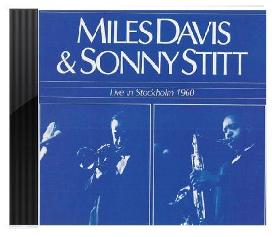Miles Davis and Sonny Stitt – Olympia 1960 Oct 11
Miles Davis and Sonny Stitt – Olympia 1960

First Concert:
1. "Walkin'"
2. "Autumn Leaves"
3. "Four"
4. Unidentified Blues
5. "Round About Midnight" play
6. "No Blues"
7. "Theme"
Second Concert:
8. "Walkin'"
9. "If I Were A Bell"
10. "Fran Dance"
11. "Two Bass Hit" play
12. "All Of You"
13." So What"
14. "Theme"
Personnel:
Miles Davis, trumpet;
Sonny Stitt, alto and tenor saxophones;
Wynton Kelley, piano;
Paul Chambers, bass;
Jimmy Cobb, drums.
On page 249 of his autobiography, Miles Davis recounts driving around Philly with Jimmy Heath, recalling that he "probably was complaining to him about Sonny Stitt playing the wrong [stuff] on 'So What,' because he would always [mess] up on that tune." The marvel is that Miles called on Stitt to replace Coltrane in the first place. But Wayne Shorter wanted to stay on with Art Blakey, so the most complete and polished bebop player of them all, a saxophonist embodying, but not extending beyond, the previous tradition took the coveted chair. Until these recordings of an October 11, 1960 Paris concert came to light, the results of the unlikely association between Miles and Stitt remained speculative. There's an earlier recording of a 1960 Paris date with Davis' quintet, only with Coltrane. Most of us assumed the Stitt edition of Miles' group had never been recorded.
So now we know what Miles was talking about. Stitt's musical style—about melodic "formulas" and rhythmic/harmonic "closure"—is clearly "wrong" for Miles, but not necessarily for Sonny. On all of the tunes, including the modal "So What," Stitt "locks" into the time, much like a Coleman Hawkins, and plays within the harmonies of the tune, coming back to the tonic note at every opportunity. Miles if anything overplays, as though he's determined to rub Sonny's nose in the new music until he gets it. Sonny will have none of it. He counter-punches with his very best shots, exhausting the melodic/harmonic vocabulary inherited from Bird and Diz. The result is a dazzling display of disparate pyrotechnics, perhaps the last time Miles would play this aggressively on record as well as the first time he would play this consistently "outside" the harmonies of the tunes. For my money, this quintet is more exciting, perhaps even breath-taking, than the Shorter-Hancock-Carter-Williams unit that would soon succeed it. A couple of caveats: there's considerable audio distortion, especially of the trumpet. And of course this is not an album for anyone who is just beginning a Miles Davis collection. But for Davis and Stitt followers as well as listeners who are knowledgeable about styles and traditions, this gladiatoral confrontation is endlessly fascinating, if not essential.
download (mp3 @192 kbs):
uploaded yandex 4shared mega mediafire solidfiles zalivalka cloudmailru
Zmieniony (Wtorek, 10 Luty 2015 22:54)








